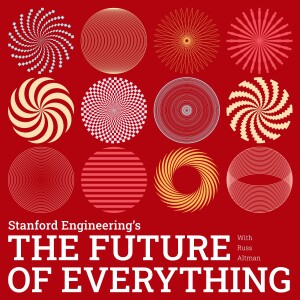
Alex Dunn: When cells communicate by nudging one another
 2020-04-03
2020-04-03
Download
Right click and do "save link as"
New research explores how physical pushing and pulling between cells helps them differentiate into the myriad cell types in the body.
Have you ever pondered how the cells in your hand knew to become a hand and not, say, a foot or a heart or an ear? Alex Dunn is a chemical engineer who thinks about such things a lot. He has always marveled at the way — from brain to blood to bone — the many cells that make up our bodies derive from just a single cell created when sperm meets egg. He says that process of differentiation comes down to far more than genetics or biochemistry can explain.
Dunn counts himself as among an emerging field known as “mechanobiology” that is exploring how physical forces — the tugging and nudging that goes on between cells — play a very important part in how cells differentiate and self-organize into the complex systems that make up the human body.
Dunn says there’s still a lot we don’t know about mechanobiology, but the process of observing and analyzing the behavior of invisible molecules inside a cell is not unlike trying to understand how a bakery works by peering in the window.
For a glimpse inside the inner workings of human cells and the very latest science of cell differentiation, join chemical-engineer-turned-mechanobiologist Alex Dunn for the latest episode of The Future of Everything podcast from Sirius XM with bioengineer and host Russ Altman.Connect With Us:
Episode Transcripts >>> The Future of Everything Website
Connect with Russ >>> Threads or Twitter/X
Connect with School of Engineering >>> Twitter/X
view more
More Episodes
Regenerating and rejuvenating human tissues
 2022-03-12
2022-03-12
 2022-03-12
2022-03-12
Why AI must embody the values of its users
 2022-02-22
2022-02-22
 2022-02-22
2022-02-22
Cynthia Lee: How to teach computer science
 2021-12-13
2021-12-13
 2021-12-13
2021-12-13
Irene Lo: How math makes markets fairer
 2021-06-26
2021-06-26
 2021-06-26
2021-06-26
012345678910111213141516171819
Create your
podcast in
minutes
- Full-featured podcast site
- Unlimited storage and bandwidth
- Comprehensive podcast stats
- Distribute to Apple Podcasts, Spotify, and more
- Make money with your podcast
It is Free
- Privacy Policy
- Cookie Policy
- Terms of Use
- Consent Preferences
- Copyright © 2015-2024 Podbean.com




